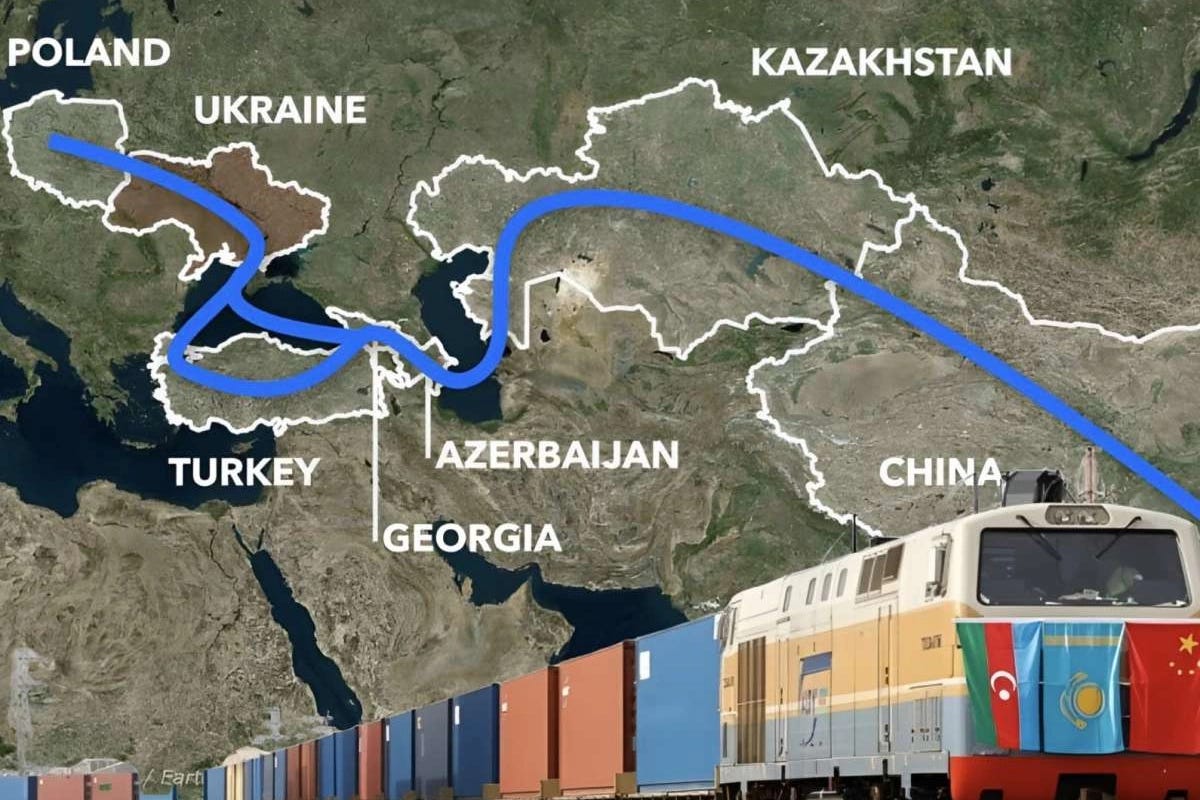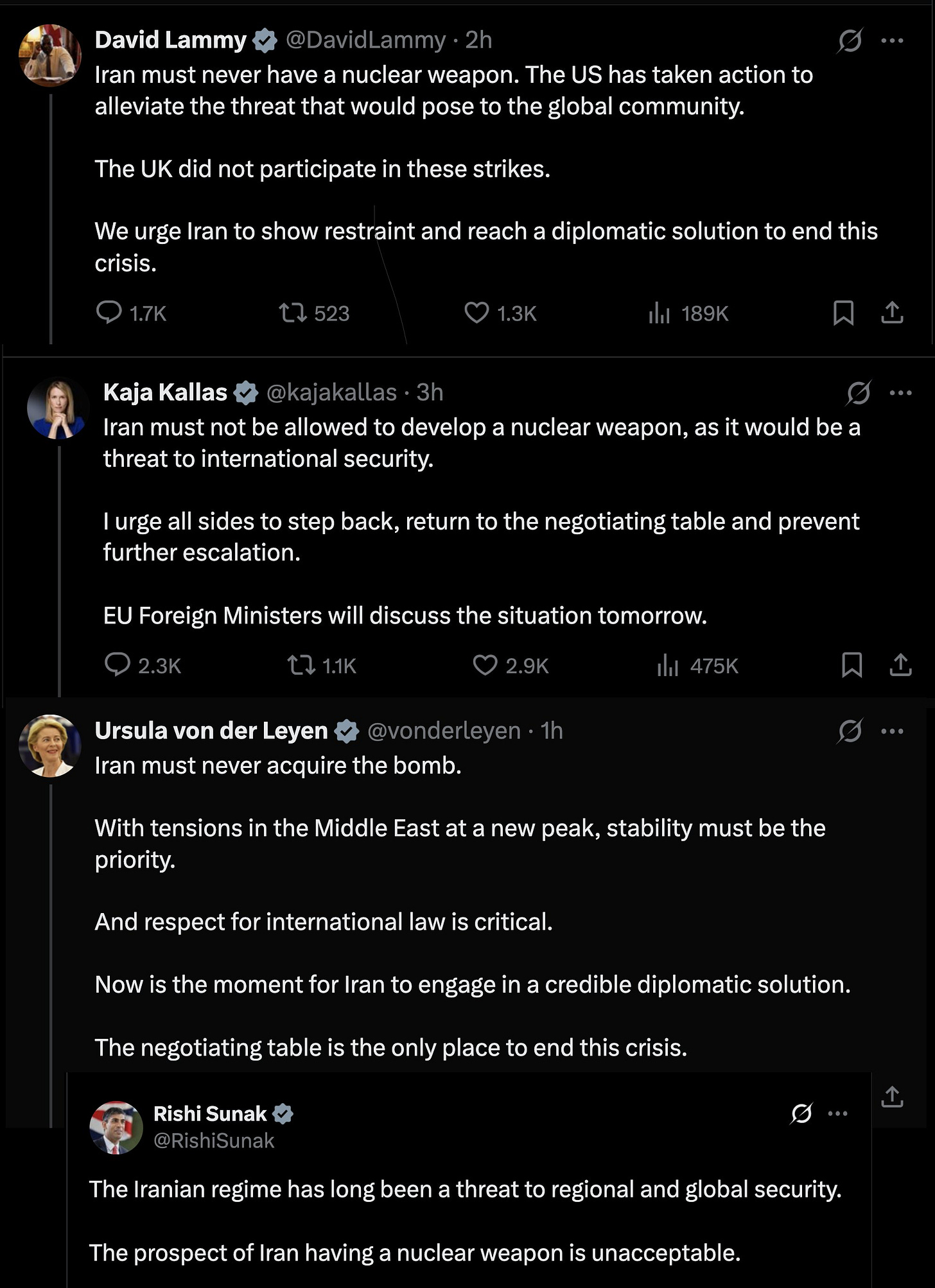America’s entanglement in Israel’s conflict with Iran signals the decline of its geopolitical dominance. Long-time readers of OtterlyCorrect might expect me to cheerlead this shift, but I am gravely concerned about the potential ramifications. A war with Iran defies any coherent geopolitical strategy, and risks devastating an already fragile global economy.
It’s increasingly clear that this is Israel’s war. Reuters has reported JD Vance opposed Trump’s plan to bomb Iran’s nuclear sites, stating, “the United States shouldn't be directly involved” and suggesting that the Israelis were going to drag the country into war. Vance’s reaction underscores that Israel acted independently, revealing that America no longer holds its allies on a tight leash. Unruly allies pulling the world’s supposed superpower into a war with no strategic interest sets a dangerous precedent for the West’s future. If the Pentagon no longer controls all the levers, could other states strategically force America’s hand, draining its resources and further eroding its already waning economic strength? When blood is in the water, the sharks feast.
But what about China?
Some argue that this conflict serves America’s geopolitical strategy to curb China’s influence. They claim regime change in Iran would weaken China economically and temper its ambitions. Let’s unpack this imbecilic theory.
China registered a trade surplus of nearly a trillion dollars in 2024, of which its trade balance with the United States accounts for approximately 361 billion. China’s exports to Iran were $8.95 billion in 2024 according UN COMTRADE, contributing to a current account surplus of just 2.2% of GDP. A war with Iran could serve to boost these figures, as China currently supplies Iran with dual-use goods for military applications and might increase its support potentially turning this conflict into the USA’s Ukraine.
China relies on Iran for discounted oil, as sanctions limit Iran’s ability to sell elsewhere, enabling China to secure crude at favorable rates. This accounts for 10-15% of China’s total crude oil imports and roughly 90% of Iran’s oil exports. Losing Iranian oil could push China to expedite the Power-of-Sibera 2 pipeline, strengthening its ties with Russia, which have remained tepid since the Sino-Soviet split. Alternatively, it could enhance Sinopec’s geopolitical influence as it seeks increased imports from regions like West Africa or Brazil. China’s substantial strategic oil reserves would provide a buffer while it secures alternative sources.
In 2021, Iran and China signed a 25-year Strategic Cooperation Agreement, with China pledging $400 billion to bolster Iran’s economy. Yet, as of 2024, China has invested a measly $185 million, reflecting its cautious, risk-averse approach to Iran’s political instability. This restrained strategy has minimized China’s exposure, allowing it to maintain influence with frugal financial commitment while navigating the uncertainties of Iran’s volatile landscape.
Commentators often overstate Iran’s role in China’s Belt and Road Initiative, portraying it as a critical hub linking China to Middle Eastern markets via a railway extending to Turkey. Yet, China’s investment in Iran’s rail infrastructure remains limited, with only a commercial freight route to a dry port near Tehran completed. Of the $392 billion China has invested in BRI projects, Iran has received a minimal share. China has committed $1.5 billion to electrify the Tehran-Mashhad line and $1.8 billion for a high-speed rail connecting Tehran, Qom, and Isfahan, but these are modest compared to its focus on the Middle Corridor (China-Kazakhstan-Azerbaijan-Georgia-Turkey-Europe). Azerbaijan’s surging cargo transit has elevated it to China’s fourth-largest trading partner in 2024. Beijing has consistently prioritized alternative routes over Iran.
Does America have an ace up its sleeve?
The United States may have a strategy to persuade allies to cut trade dependency with China, particularly South Korea and Japan. South Korea’s new president, Lee Jae-myung, elected on June 3, 2025, is unlikely to cooperate by virtue of his “pragmatic diplomacy. Lee stated, “overt antagonism [with Beijing] serves neither South Korea’s national interests nor its alliance with Washington”. His call for cooperation with Beijing reflects the approach of his predecessor, Moon Jae-in, who significantly strengthened Seoul’s ties with China, which is South Korea’s largest trade partner.
Japan might be more receptive to U.S. requests to reduce trade reliance on China, given Prime Minister Shigeru Ishiba’s cautious stance toward Beijing and concerns over escalating Chinese naval aggression in the East China Sea. However, cutting trade dependence would be challenging, as China overtook the United States as Japan’s largest trade partner and top export buyer in 2020, with bilateral trade reaching $266.4 billion in 2023. Washington faces a formidable challenge in persuading allies like Japan to jeopardize their economies for temporary political leverage over China, especially when economic ties with Beijing remain critical to their stability.
And here comes my polemics…
America is crumbling, Europe is faltering, and our elites seek to preside over decay while dragging the world into the abyss to maintain their grip on the ruins. The United States has entered the “crabs in a bucket” phase of its empire, clawing others down rather than rising itself. New strategies or a radical reimagining of their global role are nowhere in sight, and it remains doubtful that America’s pride can muster the humility for inward reflection.
Earlier this year, I held faint hope for the European Union. Friedrich Merz’s talk of distancing from NATO, Emmanuel Macron’s push for an EU army to counter U.S. dominance, and Mario Draghi’s call for sweeping economic reforms suggested a potential awakening. Yet, it was all empty rhetoric. Ursula von der Leyen and her polished coterie parrot Pentagon talking points, offering no vision beyond subservience. Europe is sliding into irrelevance, battered by rampant inflation, crippling energy costs, and stagnant growth. Without bold economic measures, the EU’s creaking ship risks sinking under the weight of its own inertia.
It’s over.
Iran’s order to close the Strait of Hormuz threatens to choke a vital artery carrying 20% of the world’s oil, dealing a crippling blow to Gulf states and the global economy. This reckless escalation risks spiraling into all-out war, with U.S. boots on the ground bogged down by Iran’s mountainous terrain. Invasion will be logistical quagmire dwarfing past Middle Eastern debacles. Iran’s Houthi allies could amplify the chaos by intensifying attacks in the Red Sea, further strangling trade routes. With two critical shipping lanes under siege, our stagnant Western economies risk collapsing under the weight of a self-inflicted crisis.
The West is governed by incompetent goons. At its best, America is a decaying empire, flailing to hobble China’s ascent. At its worst, it serves as an attack dog for petty client states, tethered to their parochial whims. Trump’s tariffs eroded global trust and diminished America’s prominence on the world stage. Biden’s sanctions on Russia mended Beijing’s long-fractured ties with Moscow, forging a formidable anti-Western axis. The world is turning away from America’s erratic behaviour, and the message of its B-2 stealth bombers echoes globally — the United States can no longer leash its own vassals, let alone lead them.








Excellently said. I’m thinking of reading up on the Belt and Road Initiative, as I know shockingly little about it. I used to have a little more knowledge when I watched Caleb Maupin, but he was biased in its favor as a Marxist-Leninist/Supporter of China and a journalist for RT.
"The West is governed by incompetent goons. At its best, America is a decaying empire..."
What exactly does The modern West defend, or even stand for? It's a third world walmart where invaders get all the perks of citizenship just by showing up.